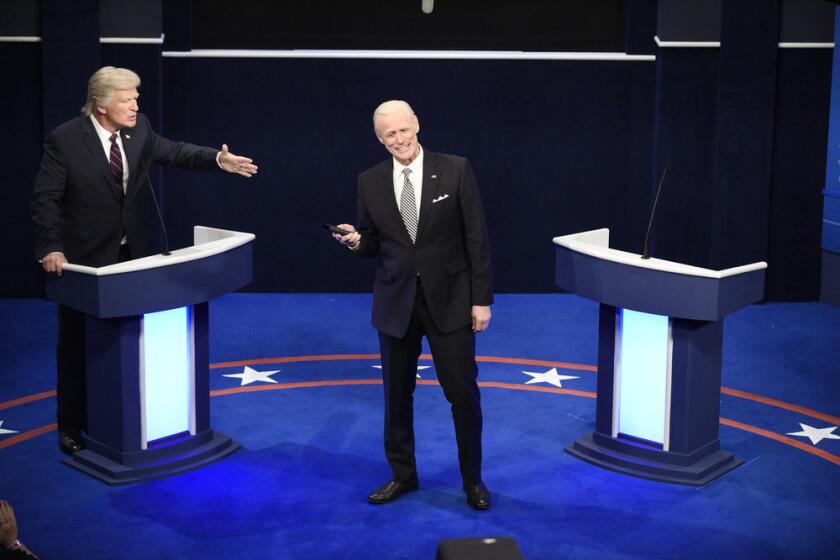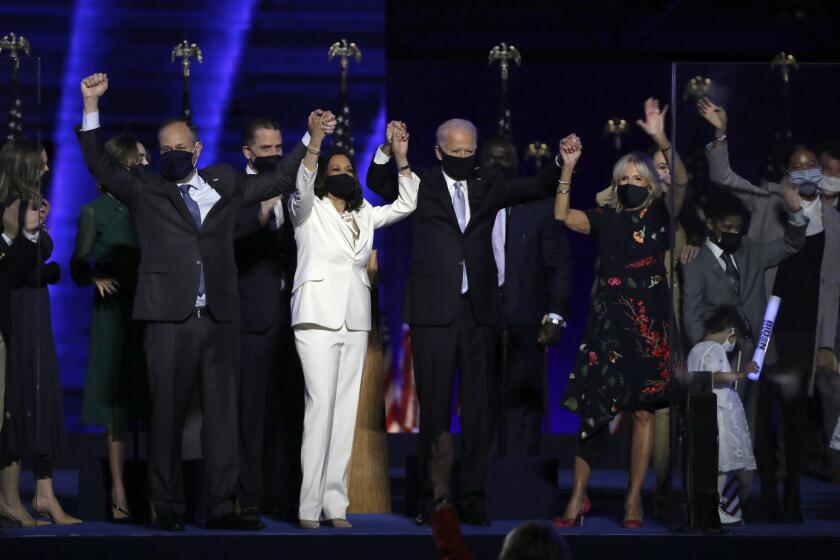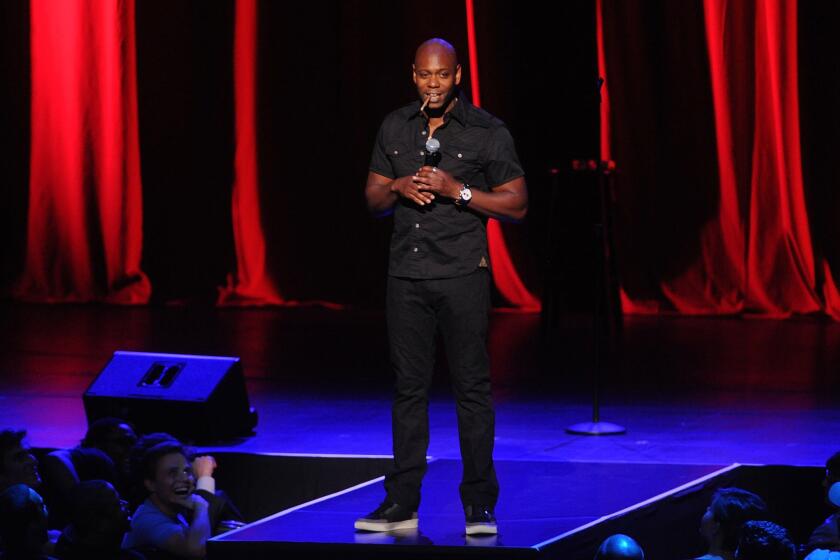Review: ‘Saturday Night Live’ brings back host Dave Chappelle to bookend four years of Trump
To host its first broadcast after the 2020 presidential election, “Saturday Night Live” chose Dave Chappelle, who hosted (and won an Emmy for doing so) the first broadcast after the 2016 presidential election. In the first instance, many viewers would have gone to the show for commiseration, for the kind of perspective that only comedy can offer. (I cannot swear that “SNL” viewership largely trends politically left, but given the content, it would be weird if it didn’t.)
This year, viewers would presumably have turned to NBC’s late night mothership to cap a day of celebration — though Chappelle was no more ready to simply celebrate in 2020 than he was to simply castigate in 2016, when he closed his opening monologue saying, “I’m wishing Donald Trump luck, and I’m going to give him a chance, and we, the historically disenfranchised, demand that he give us one too.”
That Saturday’s broadcast started late — due to a college football overtime — felt frustrating on this particular day, even to an irregular viewer. Comedy has been the filter through which many of us have been able to stomach the news these past four years; anticipating what “SNL” will have to say about the week is, for many, a way to get through it. By continually bringing in new blood — exchanging its blood — the show has managed to stay current through the years. It’s not always funny, but it continues to matter.
The typically topical cold open, which played off president-elect Joe Biden’s victory speech, opened with Beck Bennet as CNN anchor Wolf Blitzer (“I’ve been awake so long that my weird stubbly beard finally makes sense”) and Alex Moffat as John King, fingers worn down to stubs from “85 hours” at the touch screen.

Jim Carrey’s portrayal of Biden, pitched by the actor and debuted during the show’s season opener, seems to be based entirely on the idea of Biden as a spry, flinty tough guy, even though many of the jokes are just about him being old. (“I’ve never felt so alive, which is ironic because I’m almost dead.”) You get much more Carrey here — the Carrey who tends to mug, that is, rather than the one who can actually act — than you do Biden; apart from an excellent hairpiece, the impersonation doesn’t resemble him at all. That is not strictly necessary, of course, but I find Carrey’s performance tiring — which is not quite to say tiresome.
Host Chris Rock and musical guest Megan Thee Stallion marked the return of “SNL,” which was — for better and for worse — as “SNL” as ever.
Maya Rudolph’s Kamala Harris, by contrast, catches the sound and look and cool sass of the vice president-elect; she appeared Saturday in an outfit so miraculously close to the one Harris had worn just hours earlier that one suspects there may have been some communication on this point — and if not, kudos to the costumers. (Kudos regardless.) To interrupting cheers, she announced herself as “the first female, the first Black, the first Indian American and the first biracial vice president — and if any of that terrifies you, well, I don’t give a funt.” Addressing herself to “all the little Black and Brown girls watching,” she said, “The reason your mom is laughing so much tonight is because she’s drunk, and the reason she’s crying is because she’s drunk. Your mom is going to switch from laughing to crying to dancing pretty much all night. And it’s not because she’s crazy, she’s drunk.”
Rudolph’s Harris (especially on this night) is a celebration with personal resonance, unlike, say, Alec Baldwin’s sour, puckering Trump — also present in the cold open to deliver a victory speech which, facts being facts, finally found him at a piano singing a sad slow chorus of “Macho Man” in a clear callback to Kate McKinnon’s lovely, contemplative performance of “Hallelujah,” sort of as Hillary Clinton, in the 2016 post-election cold open several lifetimes ago. With two unpredictable months left before Inauguration Day, this was undoubtedly not Baldwin’s last time donning the orange wig, but no one (including the actor, reportedly) will be sad to see it boxed or binned.
Weekend Update, which usually falls somewhere past the midpoint of the 90-minute broadcast, is in some ways its purest moment — and by definition, its most topical — although in contrast to its early absurdist Francisco-Franco-is-still-dead days, at a time when the absurdities of the world best the maddest ideas out of the writers room, the segment has become something more pointed and political; Michael Che, especially, approaches the anchor job with a kind of jolly editorial ire. (“Trump has reportedly said to allies that he will have to be dragged out of the White House kicking and screaming… Good!” he said Saturday, and took a drink.) Weekend Update is also where cast members can do character work without the narrative confines of a sketch; this Saturday gave us McKinnon’s demonic Rudolph W. Giuliani, outlining Trump’s challenges to the election results:
“First, we’re going to throw out bogus mail-in ballots ... these ballots, they could be coming from Mars!” McKinnon’s Giuliani said. (“That is a real thing you really did say,” co-host Colin Jost interjected, meaning the actual Giuliani.) “So we’re gonna demand that we look at all the names … if the name is Meep Thorp Xandar and the address is Mars, we’re going to get those ballots thrown out …. We’ve got no idea if they’re really ballots, they might be tortillas; we’re going to eat them and see if they’re tortillas.”
Joe Biden wins election and calls for national unity as President Trump continues to vow to fight the results.
By the hit-and-miss standards of the show, this broadcast was more hit than miss. Chappelle participated in a couple of effective sketches, the first with Rudolph as Aunt Jemima and Kenan Thompson as Uncle Ben being fired from their jobs (Chappelle played “the Allstate Guy” — Dennis Haysbert — while Pete Davidson wore elaborate Count Chocula makeup). Another sketch, which pictured Trump escaping from the White House in a parody of the O.J. Simpson slow chase, cast Chappelle as the host of a morning show. “You hate to see it,” he said, “but you love to see it.”
Chappelle was of course mainly there to be himself — much of the work of his career has been defining just who that is — and he did exactly that in a 16-minute opening monologue. Dressed in a slim-cut suit, with a lighted cigarette and an ashtray perched on a stool at hand, he cut the figure of a comic from an earlier era, white sneakers notwithstanding. (His own career, astonishingly, is nearly three decades old.) In part because of the way he has been willing to walk away from success — though success is always waiting for him when he returns — he is as much a culture hero as a comedian, a teller of hard truths like Richard Pryor or Lenny Bruce. He is at once familiar and forbidding.

Chappelle’s disparate impulses can make it hard to gauge the level of irony in a joke, or whether a joke is even a joke. But he is never less than interesting, and I say this as someone who finds the unprofessionally obsessed “unfunny” Bruce as compelling as the more professional funny one. No one who knows Chappelle’s work would have expected a simple string of happy, election-themed jokes. And no one got that. The world may have changed Saturday, was his general theme, but maybe not all that much.
“This morning after the results came in, got a text from a friend of mine in London. And she said, ‘The world feels like a safer place now that America has a new president.’ And I said, ‘That’s great. But America doesn’t.’”
He seemed sort of happy to be there, sort of not, ready to push at whatever walls might threaten to box him in just by being himself. (He confessed to being nervous.) His monologue went all kinds of places, for better and at times for worse; passages about his white farmer neighbors in Ohio, complaining about the noise from comedy shows he was staging there, delivered more pique than perception and ran to stereotype in a way that he typically disdains. There was an uneasy comparison between Trump’s case of COVID-19 and Freddie Mercury contracting AIDS. A line about Dr. Deborah Birx appearing to listen seriously to Trump’s nonsense about the coronavirus — “I saw that, I said, ‘Oh, that’s why, that’s why women make half’” — earned a groan from the audience, which in turn prompted a weak comeback: “Did I trigger you? … I’m sorry, Lorne, I thought we were having a comedy show.”
Call it the November surprise: Dave Chappelle is heading back to a television main stage.
But Chappelle was solid on the president. “Helicopter took him to Walter Reed Hospital.... I’m from D.C. And I got to tell you, Walter Reed is not close to the White House. But you can walk. Team of doctors waiting for him, doctors came around, gave him experimental medicine and stuff. Flew him back home in the helicopter .... Then walked right in the house, killed four more people. I said, ‘$750.50 in taxes goes a long way, doesn’t it, sir?’”
As in 2016, the comedy gave way to contemplation.
“I would implore everybody who’s celebrating today remember, it’s good to be a humble winner,” said Chappelle. “Remember when I was here four years ago? Remember how bad that felt? Remember that half the country right now still feels that way. Please remember that. Remember that for the first time in the history of America, the life expectancy of white people is dropping. Because of heroin, because of suicide. All these white people out there, they that feel that anguish, that pain, they’re mad, ‘cause they think nobody cares. Maybe they don’t.
“Let me tell you something. I know how that feels .... You’re a police officer. And every time you put your uniform on, you feel like you’ve got a target on your back. You’re appalled by the ingratitude that people have when you would risk your life to save them .... Believe me, I know how that feels. Everyone knows how that feels. But here’s the difference between me and you. You guys hate each other for that. And I don’t hate anybody. I just hate that feeling. That’s what I fight through. That’s what I suggest you fight through. You got to find a way to live your life. Got to find a way to forgive each other. Got to find a way to find joy in your existence in spite of that feeling.”
And then it was Sunday.
Dave Chappelle discussed mass shootings, Black Lives Matter, even Portland unrest in his 2016 and 2020 post-election monologues. But there were differences too.
More to Read
The complete guide to home viewing
Get Screen Gab for everything about the TV shows and streaming movies everyone’s talking about.
You may occasionally receive promotional content from the Los Angeles Times.










